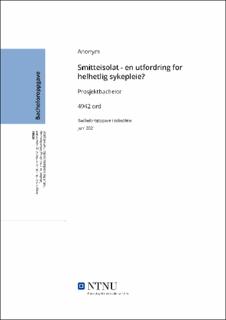| dc.contributor.advisor | Haugan, Siri | |
| dc.contributor.author | Birkeland, Karoline | |
| dc.date.accessioned | 2021-09-25T16:24:22Z | |
| dc.date.available | 2021-09-25T16:24:22Z | |
| dc.date.issued | 2021 | |
| dc.identifier | no.ntnu:inspera:81643445:34505846 | |
| dc.identifier.uri | https://hdl.handle.net/11250/2782930 | |
| dc.description.abstract | Introduksjon: Studien undersøker sykepleiers erfaringer og opplevelser rundt hvilke konsekvenser smitteisolering har for pasienters psykososiale behov. Simultant undersøkes og beskrives potensielle forklaringer til disse konsekvensene.
Metode: For å undersøke sykepleiers opplevelser og erfaringer ble kvalitativ forskningsmetode ved hjelp av intervjuer benyttet. Tre semistrukturerte intervjuer med en veiledende intervjuguide ble gjennomført ved avdelingen mars 2021. Dataen ble analysert etter prinsipper for meningsfortetning, ved hjelp av firetrinns analysemetode.
Resultater: Studiens funn viser at smitteisoleringen kan ha konsekvenser for fysiske behov, samt de emosjonelle og relasjonelle delene av psykososiale behov. Empirien viser samtidig at pasienter håndterer isoleringen ulikt. Ikke alle pasienter berøres psykososialt under isolasjon. Det er uklart hvorvidt konsekvensene skyldes isoleringsregimet alene. Potensielle forklaringer til hvorvidt isoleringsregimet påvirker psykososiale behov vises å kunne være sykepleiers funksjon og pasientens bakgrunn.
Konklusjon: Studien viser at smitteisolering kan ha psykososiale konsekvenser som følge av berørte fysiske behov, velværebehov, manglende opplevelse av kontroll og tapt sosial kontakt. Dette kommer i hovedsak til uttrykk gjennom angst, nedstemthet eller ensomhet. Ikke alle isolerte pasienter får psykososiale konsekvenser, noe som kan ha sammenheng med sykepleietiltak og pasientens ressurser, sykdom og psykologiske faktorer. Studien er for liten til å fastslå egne funn på generell basis. I videre forskning kunne det blitt arrangert flere intervjuer for å undersøke sammenhenger nærmere, samt hvilke tiltak som kunne ha hatt en forebyggende effekt. | |
| dc.description.abstract | Introduction: This study examines nurses’ experiences with psychosocial consequences in isolates patients caused by isolation. Simultaneously, the study describe potential explanation to these effects.
Method: In order to investigate nurses’ experiences and potential psychosocial consequences, qualitative research method was used. Three semi structured interviews with an indicative interview guide were conducted in March 2021. The data were analyzed using the principles of meaning condensation and a four-step analysis method.
Results: The study's findings show that infection isolation can have consequences for physical needs, as well as the emotional and relational elements of psychosocial needs. At the same time, the empirical evidence indicate that patients handle the isolation differently. Not all patients are psychosocially affected during isolation. It is unclear whether the consequences are due to the isolation regime alone. Potential explanations for whether the isolation regimen affect psychosocial needs are shown to be the nurse's function and the patient's background.
Conclusion: The study shows that infection isolation can have psychosocial consequences as a result of affected physical needs, well-being needs, lack of experience of control and less social contact. This is mainly expressed through anxiety, depression or loneliness. Not all isolated patients have psychosocial consequences, which may be related to nursing interventions and the patient's resources, illness and psychological factors. The study is too small to determine own findings on a general basis. In further research, a richer number of interviews should be arranged to investigate connections in more detail, as well as which measures that could have had a preventive effect. | |
| dc.language | nob | |
| dc.publisher | NTNU | |
| dc.title | Smitteisolat - en utfordring for helhetlig sykepleie? | |
| dc.type | Bachelor thesis | |
